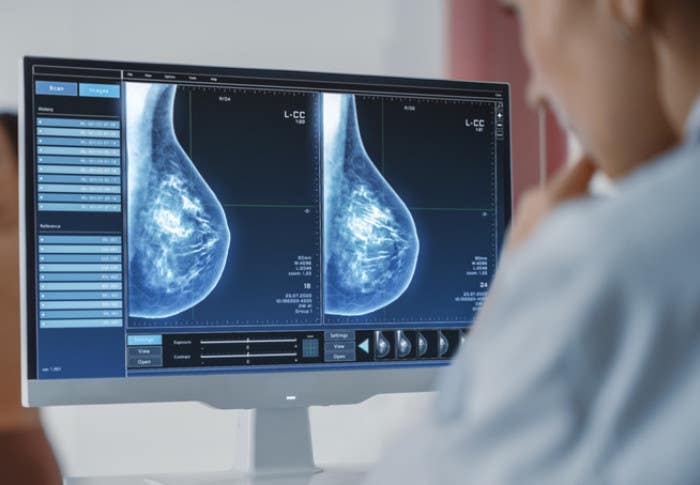Novel AI technology predicts the effectiveness of breast cancer chemotherapy
Engineers at the University of Waterloo have developed artificial intelligence (AI) technology to predict if women with breast cancer.

[Feb. 9, 2023: Ryon Jones, University of Waterloo]
Engineers at the University of Waterloo have developed artificial intelligence (AI) technology to predict if women with breast cancer. (CREDIT: Creative Commons)
Breast cancer is the second most common type of cancer in women in Canada and the United States, representing over 25% of all new female cancer cases. As such, there has been immense research and progress on improving screening techniques and processes to proactively detect the presence of breast cancer in individuals at risk. However, it is predicted that over 48,000 Canadian and American women will die from breast cancer in 2022.
Though the exact treatment pathway for breast cancer patients heavily depends on the stage of breast cancer, surgery is commonly administered to prevent breast cancer from further developing and to remove cancerous tissue. However, some non-metastatic breast cancer tumors are inoperable.
Recently, a type of treatment termed neoadjuvant chemotherapy has risen in usage as it can shrink a large tumor before surgery (so that the tumor can become operable). However, neoadjuvant chemotherapy is expensive, time-consuming, and may expose patients to radiation as well as lead to other significant side effects such as reduced fertility.
The current process to recommend neoadjuvant chemotherapy is based on the expert, but human judgment of the medical oncologist and/or radiation oncologist of whether the patient will live longer and benefit from the treatment. With potential biases and high uncertainty in clinical judgment, there is potential for some erroneous recommendations leading to some patients later developing preventable detrimental advanced cancer or being exposed to unnecessary radiation.
Related Stories
In response, engineers at the University of Waterloo have developed artificial intelligence (AI) technology to predict if women with breast cancer would benefit from chemotherapy prior to surgery.
The new AI algorithm, part of the open-source Cancer-Net initiative led by Dr. Alexander Wong, could help unsuitable candidates avoid the serious side effects of chemotherapy and pave the way for better surgical outcomes for those who are suitable.
"Determining the right treatment for a given breast cancer patient is very difficult right now, and it is crucial to avoid unnecessary side effects from using treatments that are unlikely to have real benefit for that patient," said Wong, a professor of systems design engineering.
Breast cancer radiation therapy. (CREDIT: Creative Commons)
"An AI system that can help predict if a patient is likely to respond well to a given treatment gives doctors the tool needed to prescribe the best personalized treatment for a patient to improve recovery and survival."
In a project led by Amy Tai, a graduate student with the Vision and Image Processing (VIP) Lab, the AI software was trained with images of breast cancer made with a new magnetic image resonance modality, invented by Wong and his team, called synthetic correlated diffusion imaging (CDI).
An example slice illustrating visual differences between ADC, CDIs, DWI, and T2w before neoadjuvant chemotherapy for a patient who experienced pCR. In this patient case, pCR prediction was correct for CDIs and DWI (b=800) but not the other modalities. (CREDIT: Cancer-Net BCa)
With knowledge gleaned from CDI images of old breast cancer cases and information on their outcomes, the AI can predict if pre-operative chemotherapy treatment would benefit new patients based on their CDI images.
Known as neoadjuvant chemotherapy, the pre-surgical treatment can shrink tumours to make surgery possible or easier and reduce the need for major surgery such as mastectomies.
Clinical support workflow for pCR prediction using volumetric deep radiomic features from synthetic correlated diffusion imaging (CDIs). (CREDIT: Cancer-Net BCa)
"I'm quite optimistic about this technology as deep-learning AI has the potential to see and discover patterns that relate to whether a patient will benefit from a given treatment," said Wong, a director of the VIP Lab and the Canada Research Chair in Artificial Intelligence and Medical Imaging.
A paper on the project, Cancer-Net BCa: Breast Cancer Pathologic Complete Response Prediction using Volumetric Deep Radiomic Features from Synthetic Correlated Diffusion Imaging, was recently presented at Med-NeurIPS as part of NeurIPS 2022, a major international conference on AI.
The new AI algorithm and the complete dataset of CDI images of breast cancer have been made publicly available through the Cancer-Net initiative so other researchers can help advance the field.
Note: Materials provided above by University of Waterloo. Content may be edited for style and length.
Like these kind of feel good stories? Get the Brighter Side of News' newsletter.



